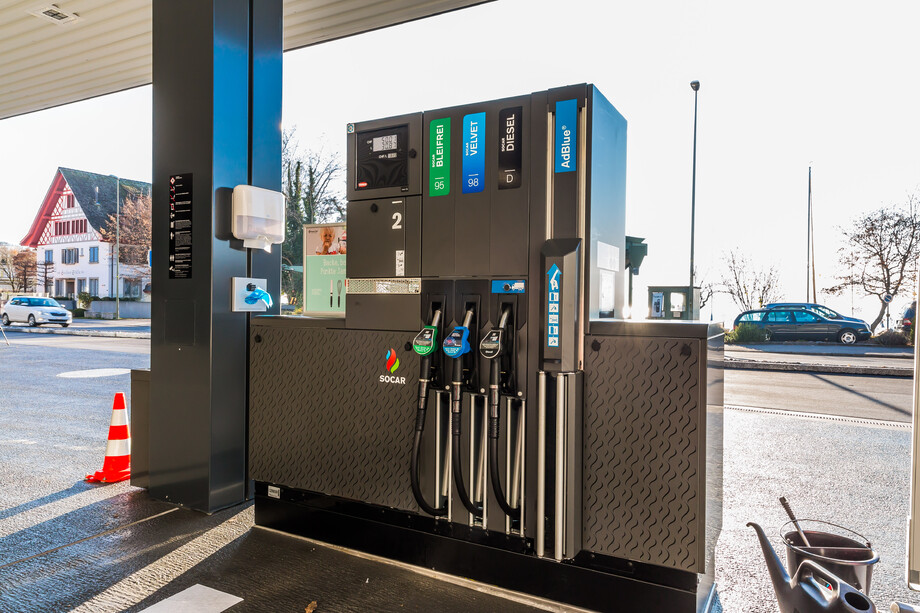
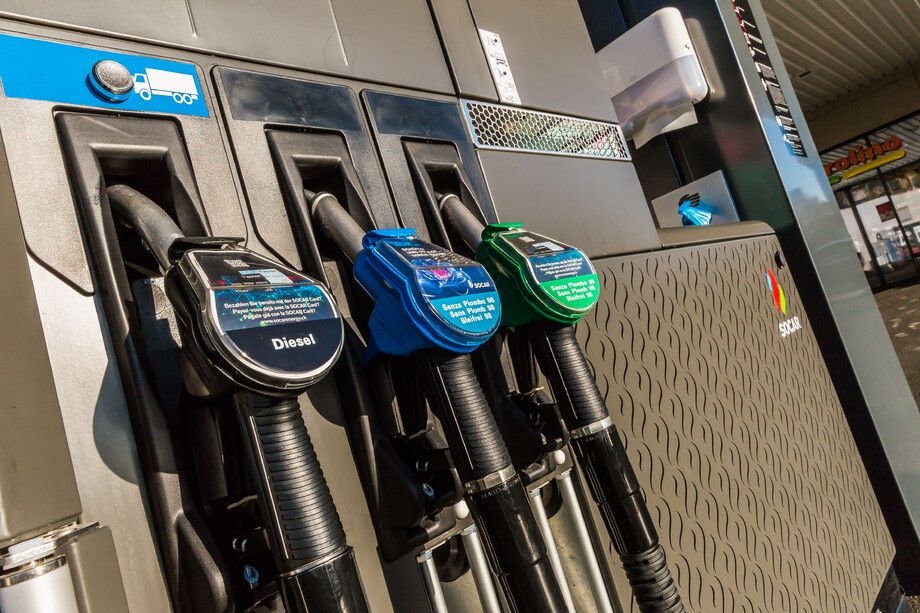
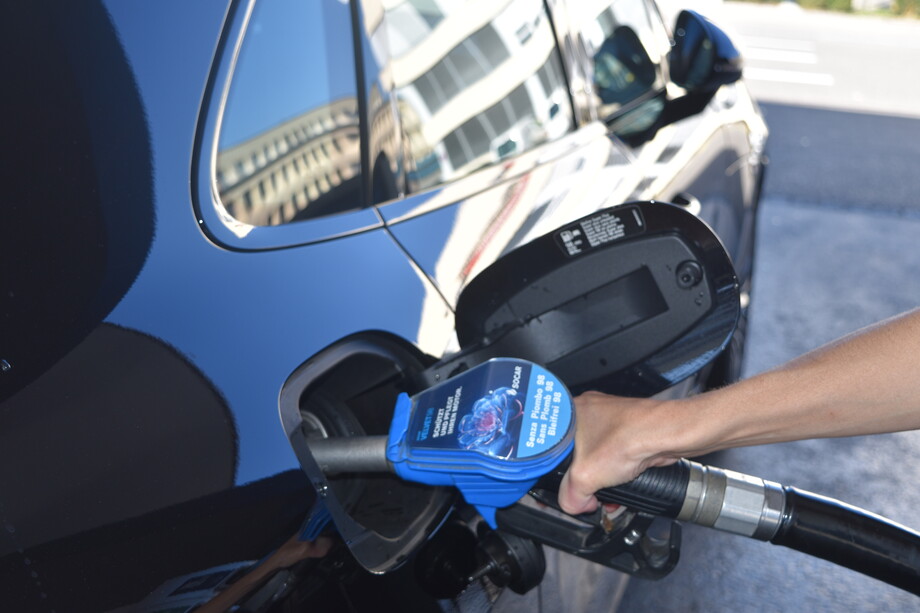

Cleaning additives are substances that are added to the fuel to allow the engine to burn the fuel more effectively. SOCAR has been using cleaning additives in its fuels for many years.
SOCAR high-quality fuels do not leave any deposits in your engine, unlike fuels from suppliers that do not include any additives in the mix. Furthermore, these fuels are designed to protect the engine against further deposits. In this way, they help keep your engine clean so that it can achieve the performance levels intended by the manufacturer.

SOCAR VELVET 98 has a highly effective double-acting protective formula specially designed to ensure that the inlet system and in particular the inlet valves are kept clean:
ZIn addition, SOCAR VELVET 98 has a high knock resistance being 98 octane fuel. Modern engines with intelligent knocking sensor systems can also use the potential within fuels with a higher octane number in terms of increased performance and reduced fuel consumption.
Higher octane content fuel can be used in any petrol engine without any problems. Therefore, SOCAR VELVET 98 can be used in all cars with petrol engines.
A fuel with a higher octane content can always be used without hesitation with any petrol. We recommend the uses of SOCAR VELVET 98 for all gasoline engines.
SOCAR VELVET 98 can be mixed with other types of petrol without hesitation. This is because all types of petrol sold in Switzerland comply with the fuel standard (SN EN 228).
We recommend, though, that you use SOCAR VELVET 98 regularly so that you can enjoy the full benefit of the double protection formula and permanently protect your engine from deposits.
SOCAR VELVET 98 contains a highly effective, new double-action formula specially designed to keep clean the intake system and especially the intake valves.
Furthermore, SOCAR VELVET 98 demonstrates a high knock resistance with 98 octane. Modern engines featuring intelligent knock sensors can also unlock the potential of fuels with high octane ratings to enhance their performance and reduce their fuel consumption.
The name SOCAR VELVET 98 reflects SOCAR’s high standards in terms of quality, signifies innovation and exudes a strong sense of self-reliance in the field of mobility. VELVET is distinctly smooth to the touch. It is a multi-layered fabric known for its fine surface. This surface must, however, be protected and maintained, just like the surfaces of the various engine parts. This protection and maintenance is provided by SOCAR VELVET 98.
It is not compulsory to blend in additives in Switzerland, even though this is recommended by European, American and Japanese carmakers in the World Wide Fuel Charter. It is left up to the oil companies whether they blend these additives into their fuels. This depends on the corporate strategy regarding product quality and the marketplace.
Unleaded, sulphur-free petrol is primarily intended for vehicles which are equipped with a catalytic converter to clean their exhaust gases. This is often know colloquially as "Lead-free 95". The extremely low sulphur content improves catalytic converters degree of effectiveness and service life on both old and new vehicles.
In addition, it reduces the pollutant emissions. SOCAR also adds cleaning additives to this fuel. These are cleaning additives which ensure that there is trouble-free combustion of the fuel in the engine and that no deposits are left there.



The basis for pioneering diesel generation requires a high-quality diesel fuel combined with a scientifically precisely tailored additive package made up of the following components:
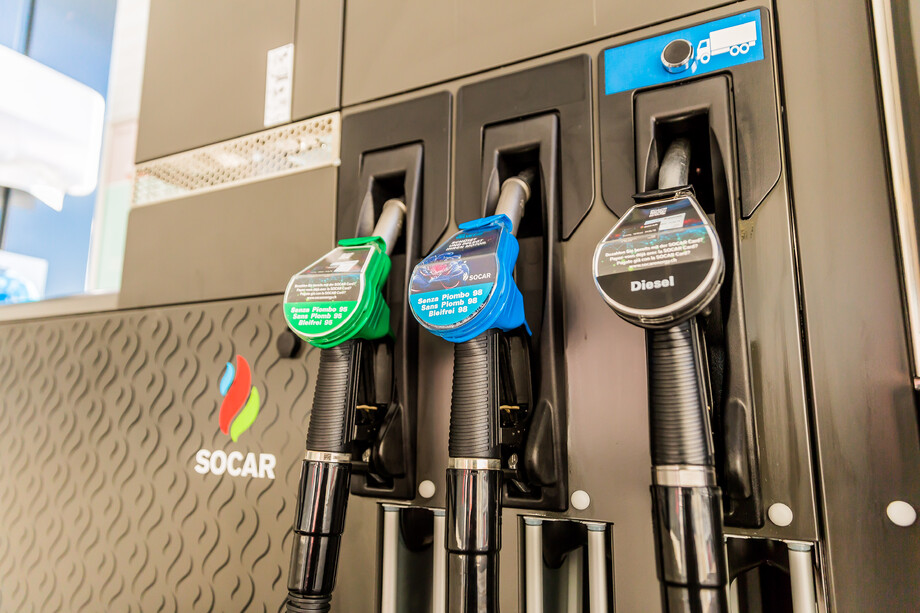
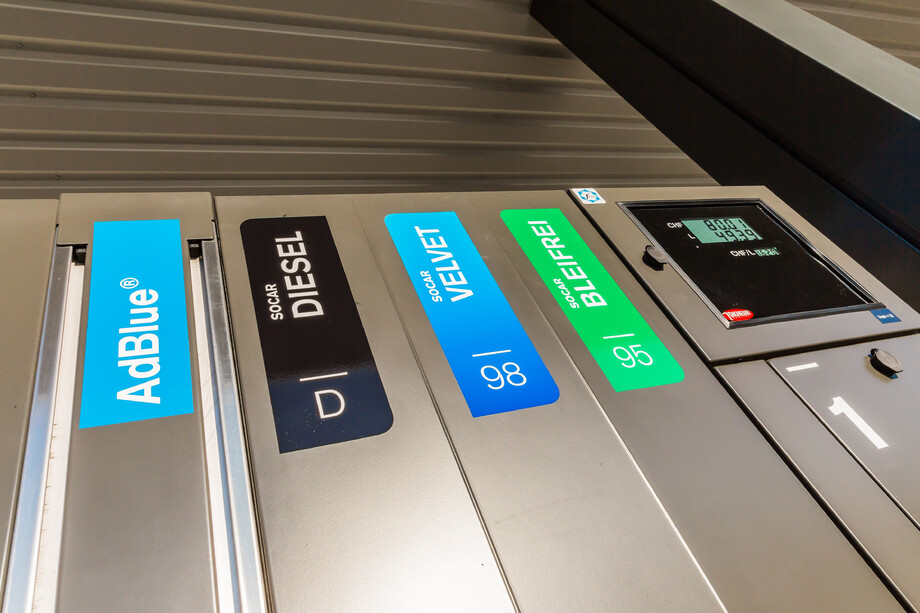
Since the start of August 2024, the SOCAR service station in Zuchwil has been offering the new SOCAR Diesel HVO 25 fuel. This fuel is a mixture of conventional diesel and HVO (hydrotreated vegetable oil) diesel – a renewable or synthetic diesel obtained from biogenic waste materials such as used cooking oil or fat. Compared to fossil diesel, this fuel has a significantly better CO2 footprint, as the CO2 released during combustion has previously been captured by the plants from which the biogenic substances originated.
HVO diesel is made from biogenic waste, such as used vegetable oils or food waste, and is then processed into diesel. For technical reasons, SOCAR does not add cleaning additives to SOCAR Diesel HVO 25.
SOCAR Diesel HVO 25 is a mixture of conventional diesel and approximately 25% renewable diesel, which is obtained from reprocessed vegetable oils and animal fats. For technical reasons, the exact proportion of HVO diesel may differ from the 25% figure by a few percentage points.
SOCAR Diesel HVO 25 is compatible with all vehicles approved for conventional diesel according to SN EN 590; therefore, any vehicle that can use conventional fossil diesel can also be filled with SOCAR Diesel HVO 25.
If your vehicle manufacturer has approved the use of conventional diesel according to SN EN 590, it is absolutely fine to mix SOCAR Diesel HVO 25 with the diesel already in your tank.
HVO diesel is based on renewable raw materials, and its combustion in the engine produces lower greenhouse gas emissions, lower soot and particulate emissions, and lower NOx and SOx emissions than fossil diesel. As a result, HVO diesel improves the fuel’s LCA (life cycle assessment).
HVO diesel is more expensive to produce than conventional diesel, as it includes raw materials that often cost more than fossil raw materials. Raw materials such as used cooking oils or animal fats are only available on a limited scale. Fuel made from 100% HVO diesel would therefore cost significantly more than conventional fuels. In addition, HVO 100% can only be used in vehicles for which it has been explicitly approved.
Yes, SOCAR Diesel HVO 25 is usually slightly more expensive than conventional SOCAR diesel. This is due to the higher production costs resulting from the use of renewable raw materials with limited availability.
SOCAR offers Diesel HVO as a sustainable alternative to conventional diesel. Unlike standard diesel, HVO contains almost no sulphur, nitrogen or aromatics, which results in cleaner combustion and significantly fewer soot and particle emissions.
HVO stands for “Hydrotreated Vegetable Oil” – a renewable or synthetic diesel produced from biogenic waste materials and plants, without using palm oil and without competing with food production. Compared to fossil diesel, HVO has a much better CO2 footprint because the CO2 released during combustion was previously absorbed by the plants used to produce it.
Two variants are available at selected SOCAR stations: HVO100 and HVO25.
SOCAR Diesel HVO100 consists of 100% HVO diesel and is a fully renewable alternative to fossil diesel. It reduces CO2 emissions by up to 90% – without the need for engine modifications.
HVO100 can be used in all diesel vehicles with XTL approval, without any technical changes. If your fuel cap shows the “XTL” label, you can safely and easily switch to HVO100.

1. Biomass
HVO100 is made from organic waste materials and plants. Nothing is grown specifically – waste becomes a climate-friendly fuel.
2. Production of biofuels
The biomass is processed using an innovative hydrogenation method. This produces a pure, high-quality diesel without added environmental burden.
3. Biogenic CO2 emissions
Driving emits CO2 – but only as much as the plants originally absorbed. The carbon cycle remains closed.
4. Photosynthesis
Nature completes the circle: plants absorb CO2 from the air again, providing a long-term source for new and sustainable energy.
This fuel will be available at selected SOCAR stations starting in spring/summer 2025.
SOCAR Diesel HVO25 is a blend of conventional diesel and approximately 25% HVO diesel. This mixture reduces CO2 emissions and improves the environmental footprint compared to regular diesel. With this blend, CO2 emissions can be reduced by up to 20% compared to fossil diesel.
SOCAR Diesel HVO25 is compatible with all vehicles approved for standard diesel according to SN EN 590. Any vehicle that runs on conventional diesel can also use SOCAR Diesel HVO25.
This fuel has been available since August 2024 at the SOCAR service station in Zuchwil.
HVO diesel is made from biogenic waste materials and plants and then processed into diesel. Unlike conventional diesel, HVO is nearly free of sulphur, nitrogen and aromatics, resulting in cleaner combustion with fewer soot and particle emissions. For technical reasons, SOCAR does not add detergent additives to HVO diesel.
Another advantage of HVO is its excellent storage stability and cold resistance. Even at temperatures as low as –30 °C, this fuel offers reliable ignition quality and ensures dependable engine starts.
SOCAR Diesel HVO100 is made from 100% renewable diesel. Compared to fossil diesel, it reduces CO2 emissions by up to 90%.
SOCAR Diesel HVO25 is a blend of conventional diesel and about 25% renewable diesel, produced from treated vegetable oils and animal fats. Compared to fossil diesel, HVO25 reduces CO2 emissions by up to 20%.
SOCAR Diesel HVO100 is suitable only for vehicles explicitly approved for pure HVO diesel.
You can easily check your vehicle's compatibility by looking at the fuel cap. If it shows the “XTL” label, you can safely refuel with SOCAR Diesel HVO100. XTL stands for “X to Liquid”, indicating the fuel is made from alternative raw materials and processed according to standard SN EN 15940.
Even if older vehicles do not display the XTL label, HVO100 may still be usable. In that case, check the owner’s manual or consult the vehicle manufacturer.
SOCAR Diesel HVO25 is compatible with all vehicles approved for standard diesel under SN EN 590.
SOCAR Diesel HVO100 should only be used in approved vehicles, but it can be safely mixed with conventional diesel.
SOCAR Diesel HVO25 can be freely mixed with any diesel already in the tank, as long as it complies with SN EN 590.
HVO diesel is based on renewable resources and emits fewer greenhouse gases, less soot and particulate matter, and lower NOx and SOx emissions than fossil diesel. It makes a significant contribution to improving air quality and reducing your carbon footprint.